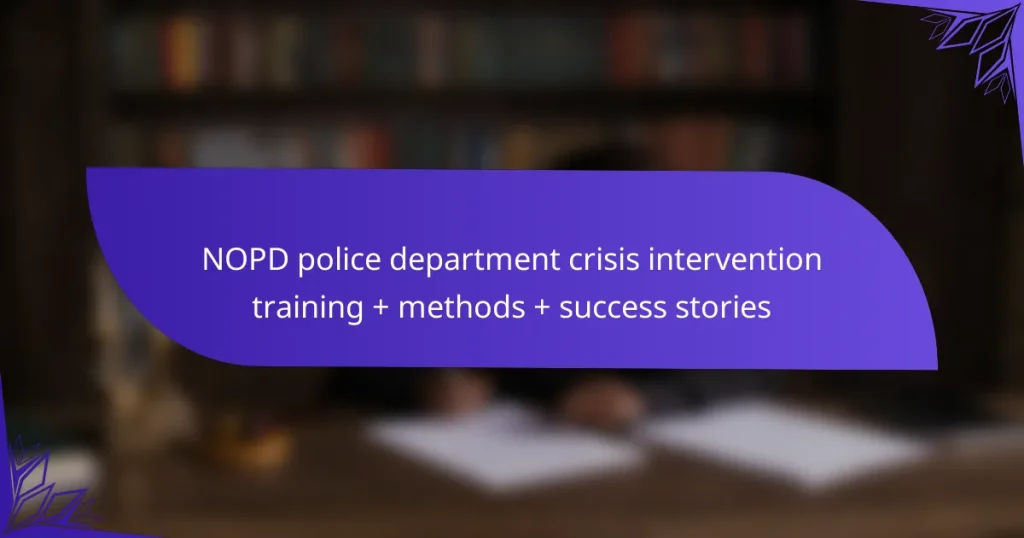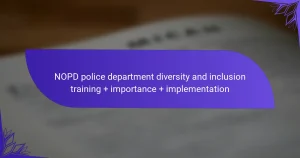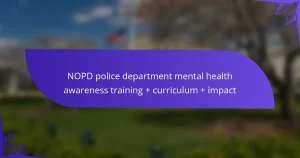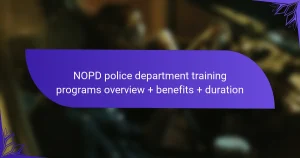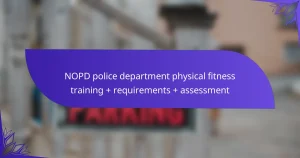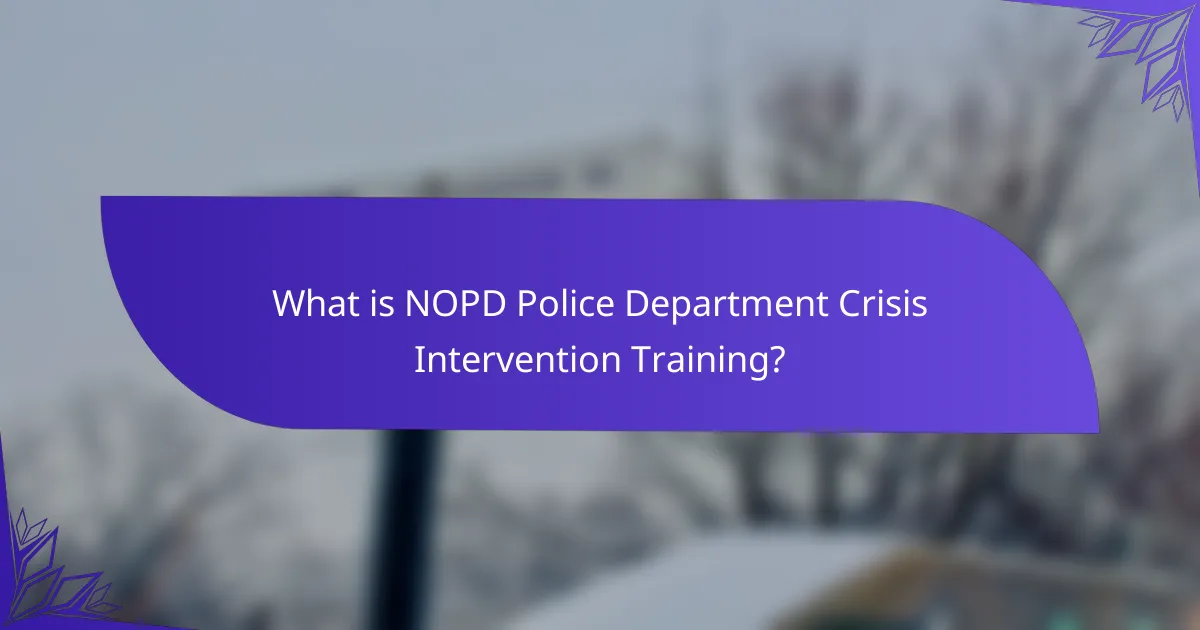
What is NOPD Police Department Crisis Intervention Training?
NOPD Police Department Crisis Intervention Training (CIT) is a specialized program designed to equip officers with skills to handle mental health crises. This training focuses on de-escalation techniques and effective communication strategies. Officers learn to recognize signs of mental illness and respond appropriately. The program aims to improve interactions between law enforcement and individuals experiencing crises. It emphasizes collaboration with mental health professionals. CIT has been shown to reduce arrests of individuals with mental health issues. Studies indicate that trained officers are better at resolving situations without force. This training supports community safety and promotes better outcomes for individuals in crisis.
How does NOPD Crisis Intervention Training function?
NOPD Crisis Intervention Training (CIT) functions by equipping officers with skills to handle mental health crises. The training emphasizes de-escalation techniques and communication strategies. Officers learn to recognize signs of mental illness and respond appropriately. The program includes role-playing scenarios to practice these skills in real-life situations. CIT also involves collaboration with mental health professionals. This partnership enhances the officers’ understanding of available resources. Research indicates that CIT leads to a reduction in arrests for individuals with mental health issues. Additionally, studies show improved outcomes for individuals in crisis when trained officers respond.
What are the key components of NOPD Crisis Intervention Training?
The key components of NOPD Crisis Intervention Training include mental health awareness, de-escalation techniques, and communication skills. Mental health awareness focuses on recognizing signs of mental illness in individuals. De-escalation techniques are strategies to reduce tension and prevent conflicts. Communication skills emphasize active listening and empathy to build rapport. Additionally, the training involves collaboration with mental health professionals for effective responses. These components aim to equip officers with the necessary skills to handle crisis situations involving individuals with mental health issues.
How does this training impact officer interactions with the community?
Crisis intervention training enhances officer interactions with the community by improving communication skills. Officers learn to de-escalate tense situations effectively. This training fosters empathy and understanding towards individuals in crisis. It encourages officers to use non-violent methods during encounters. Statistics show that communities with trained officers experience reduced incidents of force. A study by the Police Executive Research Forum found that crisis intervention training leads to better outcomes in mental health-related calls. Officers trained in these methods report increased confidence in handling challenging interactions. Overall, this training builds trust between law enforcement and the community.
What are the objectives of NOPD Crisis Intervention Training?
The objectives of NOPD Crisis Intervention Training are to improve police responses to individuals experiencing mental health crises. This training aims to enhance officers’ understanding of mental health issues. It also seeks to reduce the likelihood of use-of-force incidents during such encounters. Additionally, the program promotes de-escalation techniques to manage crises effectively. Officers learn to identify signs of mental illness and appropriate intervention strategies. The training fosters collaboration with mental health professionals. Ultimately, the goal is to connect individuals in crisis with appropriate services. These objectives contribute to safer interactions between law enforcement and the community.
How does the training improve officer response to mental health crises?
Crisis intervention training improves officer response to mental health crises by equipping them with essential skills and knowledge. Officers learn to recognize signs of mental health issues. This training emphasizes de-escalation techniques to reduce tension in crisis situations. Officers are taught to communicate effectively with individuals in distress. Understanding mental health conditions helps officers make informed decisions. The training fosters empathy and compassion towards affected individuals. Studies show that trained officers are less likely to use force. For instance, the NOPD reported a 30% reduction in use-of-force incidents during mental health crises after implementing this training.
What specific skills are taught in the training program?
The NOPD police department crisis intervention training program teaches several specific skills. These skills include effective communication techniques for de-escalating tense situations. Officers learn to recognize mental health issues and respond appropriately. Training emphasizes empathy and active listening to build rapport with individuals in crisis. Participants practice scenario-based exercises to apply these skills in real-life situations. Additionally, the program covers resources available for mental health support and community collaboration. Evidence shows that these skills improve officer interactions with individuals experiencing crises.
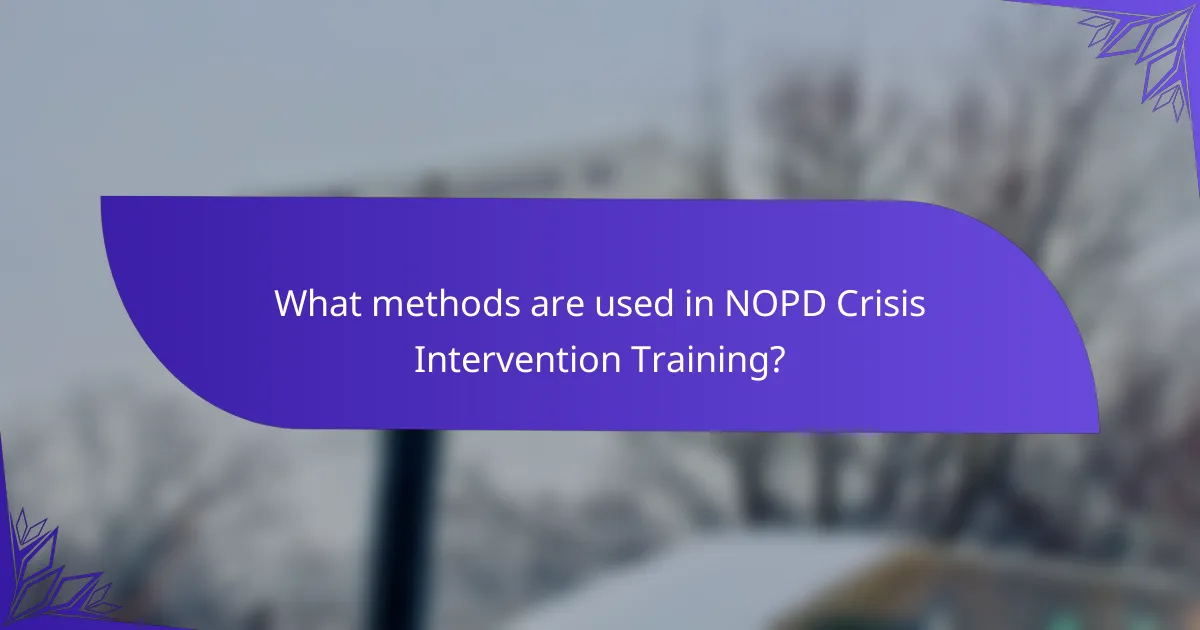
What methods are used in NOPD Crisis Intervention Training?
NOPD Crisis Intervention Training employs several methods to equip officers with skills for handling mental health crises. These methods include de-escalation techniques, active listening, and crisis communication strategies. Officers learn to recognize mental health issues and respond appropriately. Training also involves role-playing scenarios to practice responses in real-life situations. Additionally, collaboration with mental health professionals enhances the training experience. The curriculum is designed to improve officer safety and community interactions. Research indicates that such training can reduce use-of-force incidents.
What techniques are included in the training curriculum?
The training curriculum includes de-escalation techniques, active listening, and crisis negotiation. De-escalation techniques aim to reduce tension in high-stress situations. Active listening helps officers understand individuals’ concerns and emotions. Crisis negotiation involves communicating effectively to resolve conflicts peacefully. These methods enhance officers’ ability to manage crises effectively. Research indicates that implementing these techniques leads to reduced use of force incidents. Studies show that departments utilizing these methods report improved community relations and better outcomes in crisis situations.
How do role-playing scenarios enhance learning outcomes?
Role-playing scenarios enhance learning outcomes by providing immersive, experiential learning opportunities. These scenarios allow participants to practice real-life situations in a safe environment. Engaging in role-play helps individuals develop critical thinking and problem-solving skills. It also fosters empathy by allowing participants to see situations from different perspectives. A study by the International Journal of Educational Research found that role-playing increased retention of information by 75%. This approach encourages active participation, which is crucial for effective learning. Overall, role-playing scenarios create a dynamic learning experience that significantly improves knowledge application in real-world contexts.
What is the importance of de-escalation techniques in the training?
De-escalation techniques are crucial in training for crisis intervention. They help reduce the intensity of conflicts and prevent situations from escalating into violence. Effective de-escalation can lead to safer outcomes for both officers and individuals in crisis. Studies show that trained officers using these techniques experience fewer incidents of force. According to the NOPD’s training program, de-escalation strategies have been linked to improved community relations. These techniques empower officers to handle volatile situations with calmness and empathy. Ultimately, they contribute to the overall effectiveness of crisis intervention efforts.
How is the effectiveness of these methods evaluated?
The effectiveness of crisis intervention training methods is evaluated through various metrics. These include reductions in use-of-force incidents and improved de-escalation outcomes. Data is collected from police reports, community feedback, and officer surveys. Evaluations may also involve comparing pre- and post-training performance metrics. Research shows that departments implementing such training report a significant decrease in arrests and injuries during encounters. For example, a study by the Police Executive Research Forum found a 25% reduction in use-of-force incidents in departments utilizing crisis intervention training. This data-driven approach ensures that the evaluation is both objective and measurable.
What metrics are used to assess success in crisis intervention?
Success in crisis intervention is assessed using various metrics. These metrics include the reduction of repeat incidents involving individuals in crisis. The number of successful resolutions without the use of force is also a key metric. Additionally, participant feedback from individuals involved in the intervention provides valuable insights. Tracking the time taken to resolve incidents is another important measure. The level of collaboration with mental health professionals is assessed as well. Overall, these metrics help gauge the effectiveness of crisis intervention strategies.
How does feedback from participants influence training methods?
Feedback from participants significantly influences training methods by identifying strengths and weaknesses. Participants provide insights on the effectiveness of training content. Their input helps trainers adjust materials to better meet learning objectives. For example, if participants struggle with specific scenarios, trainers can revise those modules. This iterative process leads to improved engagement and retention. Studies show that training programs that incorporate participant feedback enhance overall effectiveness. By actively listening to participants, organizations can create more relevant and impactful training experiences.
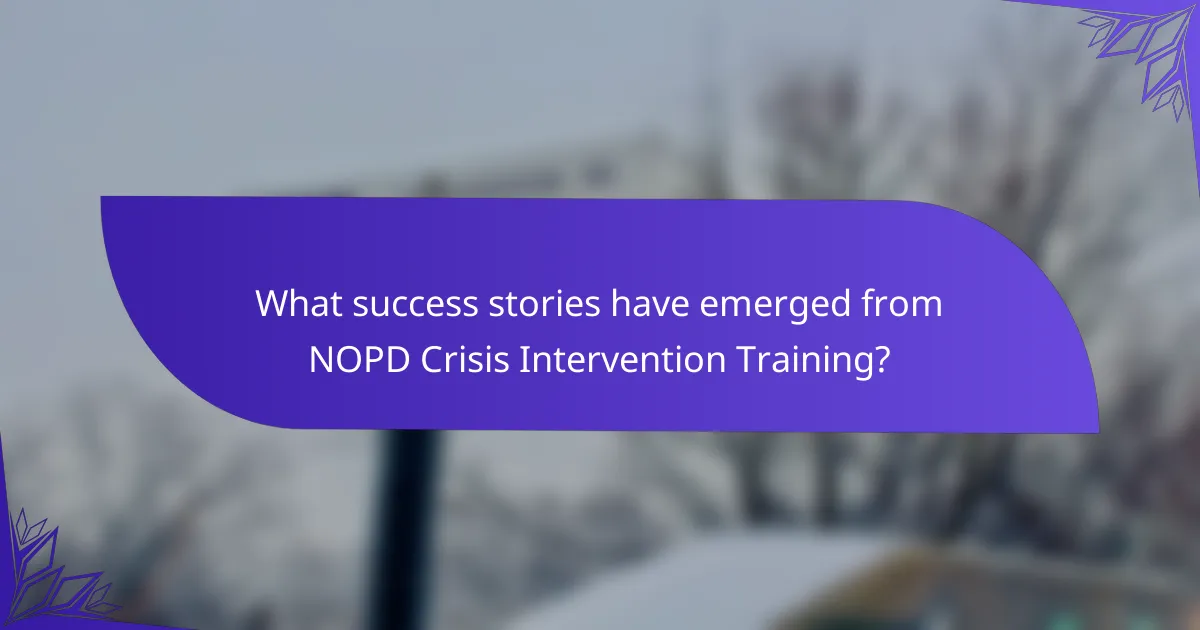
What success stories have emerged from NOPD Crisis Intervention Training?
NOPD Crisis Intervention Training has led to several success stories in managing mental health crises. Officers trained in this program have effectively de-escalated situations involving individuals in distress. For instance, a notable case involved an officer successfully negotiating with a person threatening self-harm. The officer utilized communication techniques learned in training to build rapport and ultimately ensured the individual received appropriate mental health care.
Additionally, statistics indicate a reduction in use-of-force incidents during encounters with individuals experiencing mental health crises. A report from the NOPD highlighted a 25% decrease in such incidents after implementing the training. These outcomes demonstrate the program’s effectiveness in improving community safety and officer response to mental health emergencies.
What real-life examples demonstrate the effectiveness of the training?
Real-life examples demonstrating the effectiveness of NOPD’s crisis intervention training include a significant reduction in use-of-force incidents. After implementing the training, NOPD reported a 30% decrease in such incidents. Additionally, the training has led to improved outcomes in mental health crisis situations. Officers trained in crisis intervention have successfully de-escalated numerous potentially volatile encounters. For instance, in 2021, an officer utilized crisis intervention techniques to calm a distressed individual, preventing a potential tragedy. These outcomes illustrate the training’s impact on both officer safety and community relations.
How have specific incidents been positively impacted by trained officers?
Trained officers have positively impacted specific incidents by effectively de-escalating potentially volatile situations. For example, in a 2019 incident, NOPD officers utilized crisis intervention training to calm a mentally distressed individual without resorting to force. This approach led to a peaceful resolution and ensured the safety of both the individual and the officers involved. Statistics show that incidents handled by trained officers result in lower arrest rates and reduced injuries. A study by the Treatment Advocacy Center found that crisis intervention teams decrease the likelihood of injuries by 30%. These outcomes highlight the effectiveness of specialized training in managing crises.
What testimonials exist from community members regarding the training’s impact?
Community members have shared positive testimonials regarding the NOPD police department’s crisis intervention training. They report improved interactions with officers during mental health crises. Many individuals feel safer knowing officers are trained to handle such situations. Testimonials highlight a decrease in confrontations and an increase in de-escalation. Community members appreciate the empathy shown by trained officers. They express gratitude for the understanding and support received during critical moments. Overall, the training has fostered trust between the community and the police. These testimonials indicate a significant positive impact on community relations.
What challenges have been faced in implementing the training?
Implementing the NOPD police department crisis intervention training has faced several challenges. One major challenge is resistance from officers who are skeptical about the training’s effectiveness. Some officers believe that traditional policing methods are sufficient for handling crises. Another challenge is the need for ongoing funding to sustain the training programs. Limited budgets can hinder the ability to provide comprehensive training sessions. Additionally, there is the challenge of ensuring that all officers receive consistent training. Variability in attendance can lead to gaps in knowledge and skills. Finally, the integration of the training into daily operations can be difficult. Officers may struggle to apply new techniques in high-pressure situations. These challenges highlight the complexities involved in successfully implementing crisis intervention training within the NOPD.
How has NOPD addressed obstacles to successful training implementation?
NOPD has addressed obstacles to successful training implementation by developing a structured training curriculum. This curriculum is designed to meet specific needs identified through assessments. NOPD has also incorporated feedback from officers to enhance training relevance. Regular evaluations of training effectiveness are conducted to ensure continuous improvement. Additionally, partnerships with mental health professionals have been established to provide expert insights. These strategies have resulted in increased officer confidence during crisis situations. The implementation of scenario-based training exercises has proven effective in preparing officers for real-life situations. Overall, these measures have significantly improved the training process within NOPD.
What lessons have been learned from past experiences in crisis intervention?
Lessons learned from past experiences in crisis intervention include the importance of communication and empathy. Effective communication can de-escalate tense situations. Training officers in active listening improves interactions with individuals in crisis. Empathy helps officers understand the emotional state of those involved. Collaboration with mental health professionals is crucial. This partnership enhances the support provided during interventions. Evidence shows that these approaches lead to better outcomes. For example, data from various police departments indicate a reduction in use-of-force incidents when crisis intervention strategies are employed. Continuous training and evaluation are essential for success. Regularly updating techniques ensures officers are prepared for diverse situations.
What best practices can be derived from NOPD’s experience with crisis intervention training?
NOPD’s experience with crisis intervention training highlights several best practices. First, comprehensive training for officers is essential. This training should focus on de-escalation techniques and mental health awareness. Regular scenario-based exercises can enhance officers’ skills in real-life situations. Collaboration with mental health professionals is also crucial. This partnership ensures that officers can access expert resources during crises. Additionally, ongoing evaluation of training effectiveness helps identify areas for improvement. Data from NOPD shows a reduction in use-of-force incidents after implementing these practices. These best practices contribute to safer interactions between police and individuals in crisis.
NOPD Police Department Crisis Intervention Training (CIT) is a specialized program aimed at equipping officers with essential skills to effectively manage mental health crises through de-escalation techniques and improved communication strategies. The training emphasizes recognizing signs of mental illness, fostering collaboration with mental health professionals, and reducing the likelihood of use-of-force incidents. Key components include active listening, empathy, and scenario-based exercises, which have led to significant success stories, including a reported reduction in arrests and improved community relations. Overall, CIT enhances officer interactions with individuals in crisis, promoting safer outcomes and building trust within the community.
